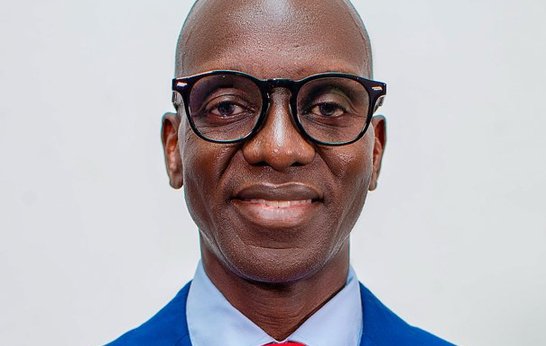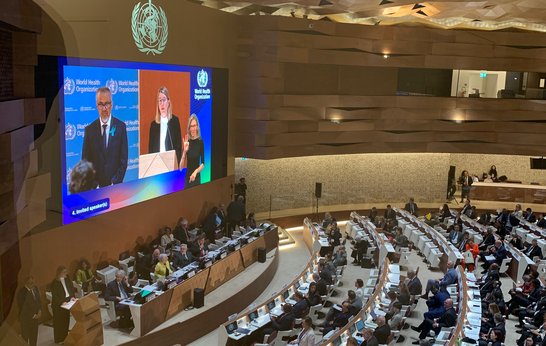As ministers of health, policymakers, and global health leaders gathered in Geneva for the seventy-eighth World Health Assembly (WHA), the Uniting to Combat Neglected Tropical Diseases team was on the ground, championing country-led action and unlocking innovative and sustainable funding to beat neglected tropical diseases (NTDs).
The week began with a call for shared progress.
The evening before WHA formally opened, Uniting took part in a high-level dinner focused on Shared Progress: How Collaborative Philanthropy Can Accelerate Country-led Health Goals. The event brought together key partners and funders to explore how joint investments and aligned action can help countries lead the way in strengthening health systems, advancing universal health coverage, and eliminating diseases of poverty such as NTDs.
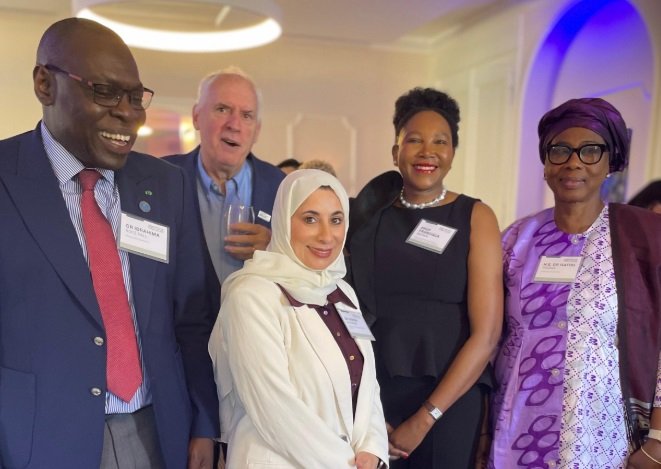
Engaging with partners and allies
Dr Isatou Touray, Executive Director of Uniting to Combat NTDs, met with Dr Soce Fall, WHO Director of Global NTD Control, and Professor Francisca Mutapi, Vice Chair of the Uniting Board and Deputy Director at TIBA. Discussions also included colleagues from academic institutions and international agencies, reinforcing shared goals for integrated, resilient, and country-owned approaches to health.
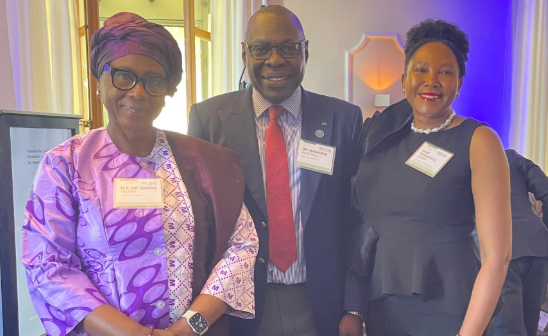
Celebrating leadership for Africa’s health future
The first day of WHA saw the announcement of Professor Mohamed Yakub Janabi’s nomination as WHO Regional Director for Africa. A respected cardiologist and health policy leader, Professor Janabi’s nomination was widely welcomed.
Dr Winnie Mpanju-Shumbusho, Chair of the Uniting Board and former WHO Assistant Director-General for HIV/AIDS, Tuberculosis, Malaria and NTDs, expressed her congratulations, writing on social media:
“Congratulations my mentee Prof Mohamed Janabi from Tanzania on your sweepingly successful election as the World Health Organization Regional Director for Africa. May God guide every step you take in this enormous leadership journey.”
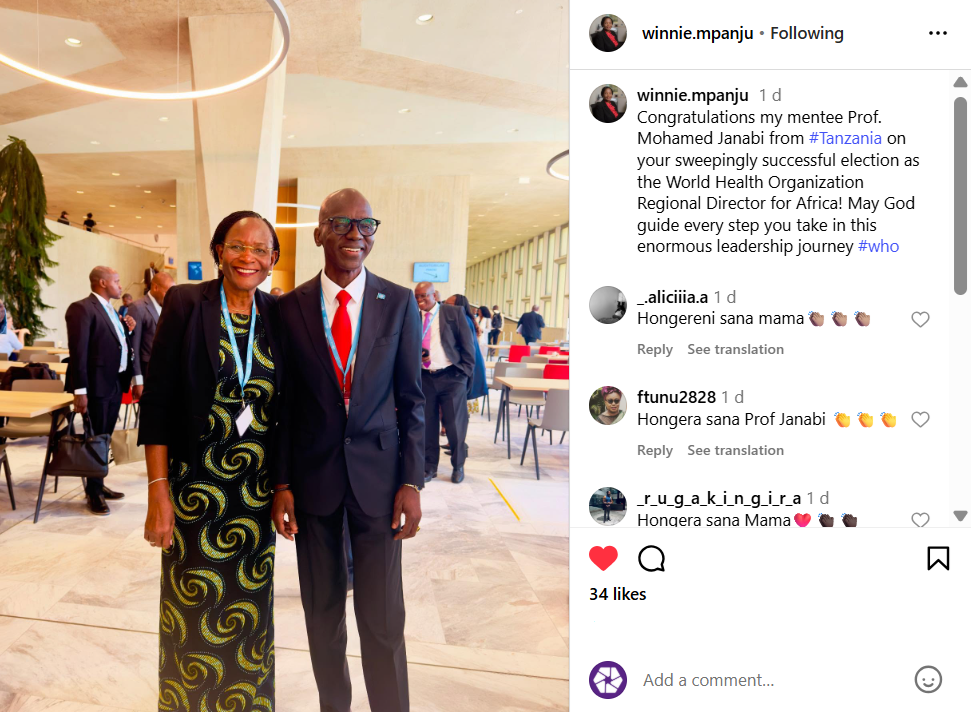
Dr Touray also shared a public statement highlighting the significance of Professor Janabi’s vision:
“Professor Janabi’s holistic approach, from addressing climate-health risks to tackling gender inequities and strengthening community health systems, resonates with the integrated, equity-focused strategies we need to beat NTDs.
We look forward to collaborating closely with Professor Janabi to accelerate progress towards a healthier, NTD-free Africa for all.”
Read the full statement here: Uniting to Combat NTDs Congratulates Professor Mohamed Janabi on his nomination as the next WHO Regional Director for Africa
Recognising global progress on NTDs
During WHA’s session on Recognition of Outstanding Achievements in Global Health, the spotlight turned to the growing momentum behind NTD elimination. Since January 2024, nine countries have eliminated at least one NTD: Niger, Guinea, Vietnam, Chad, Jordan, Brazil, Pakistan, Timor-Leste, and India. They join the forty-six other countries that have achieved similar milestones in recent years. Mauritania and Papua New Guinea announced at WHA that they have now eliminated trachoma as a public health problem.
Read more on how WHO Director-General Dr. Tedros Adhanom Ghebreyesus celebrated what he called a “golden age of disease elimination,” spotlighting historic progress in the fight against neglected tropical diseases (NTDs) and other major public health threats here.
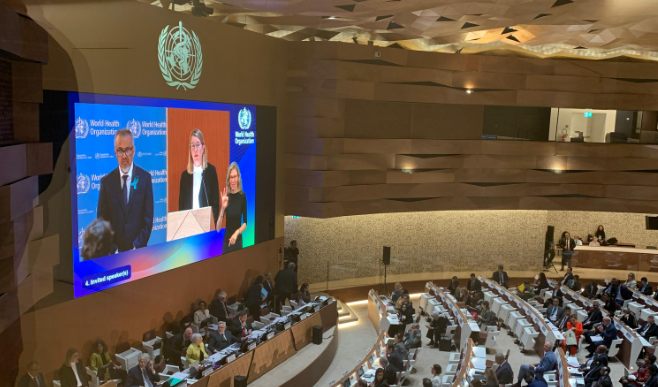
Advancing climate and health priorities
Uniting also attended a key side event on Advancing Health and Climate Discussions Towards COP Thirty: A Dialogue with the Baku Continuity Coalition. The session gathered representatives from the COP presidencies of Brazil, Egypt, the United Kingdom, Azerbaijan, and the United Arab Emirates to discuss how health can be prioritised in climate negotiations.
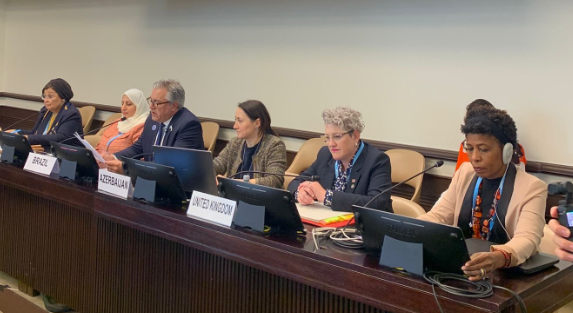
The Minister of Health of Brazil opened the event, outlining the country’s action plan ahead of COP30, which will take place in Belém. There was strong consensus that governments must take the lead in ensuring health is not only included in climate dialogues, but recognised as a central outcome of climate action.
Key messages included:
* The climate crisis is a major health crisis
* Health must remain at the centre of all climate interventions
* Ongoing feedback to policymakers, including ministers of finance, is essential to unlock climate finance for health outcomes
As one speaker concluded: “When it is all said and done, let us have more done than said.”
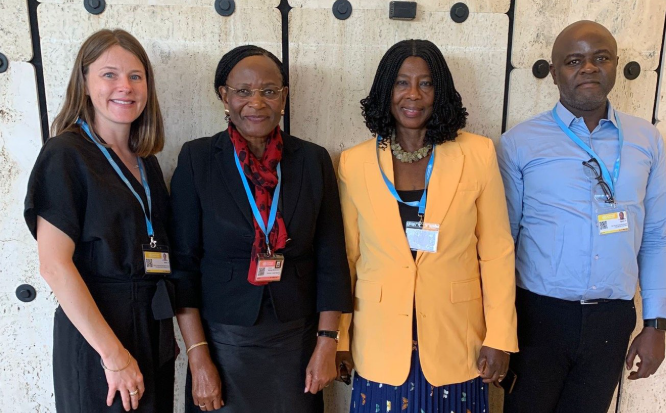
A united front for health equity
Throughout WHA, Uniting to Combat NTDs reinforced the urgent need to sustain momentum and support country-led solutions that tackle NTDs through inclusive, sustainable health systems. By joining forces across sectors and regions, we can end the neglect and ensure a healthier future for the 1.65 billion people still affected by these diseases.
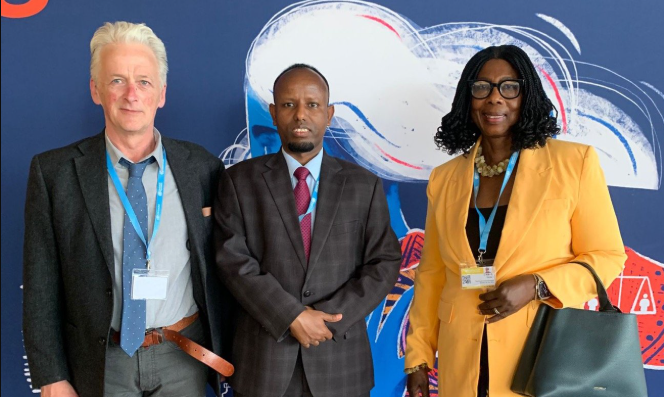
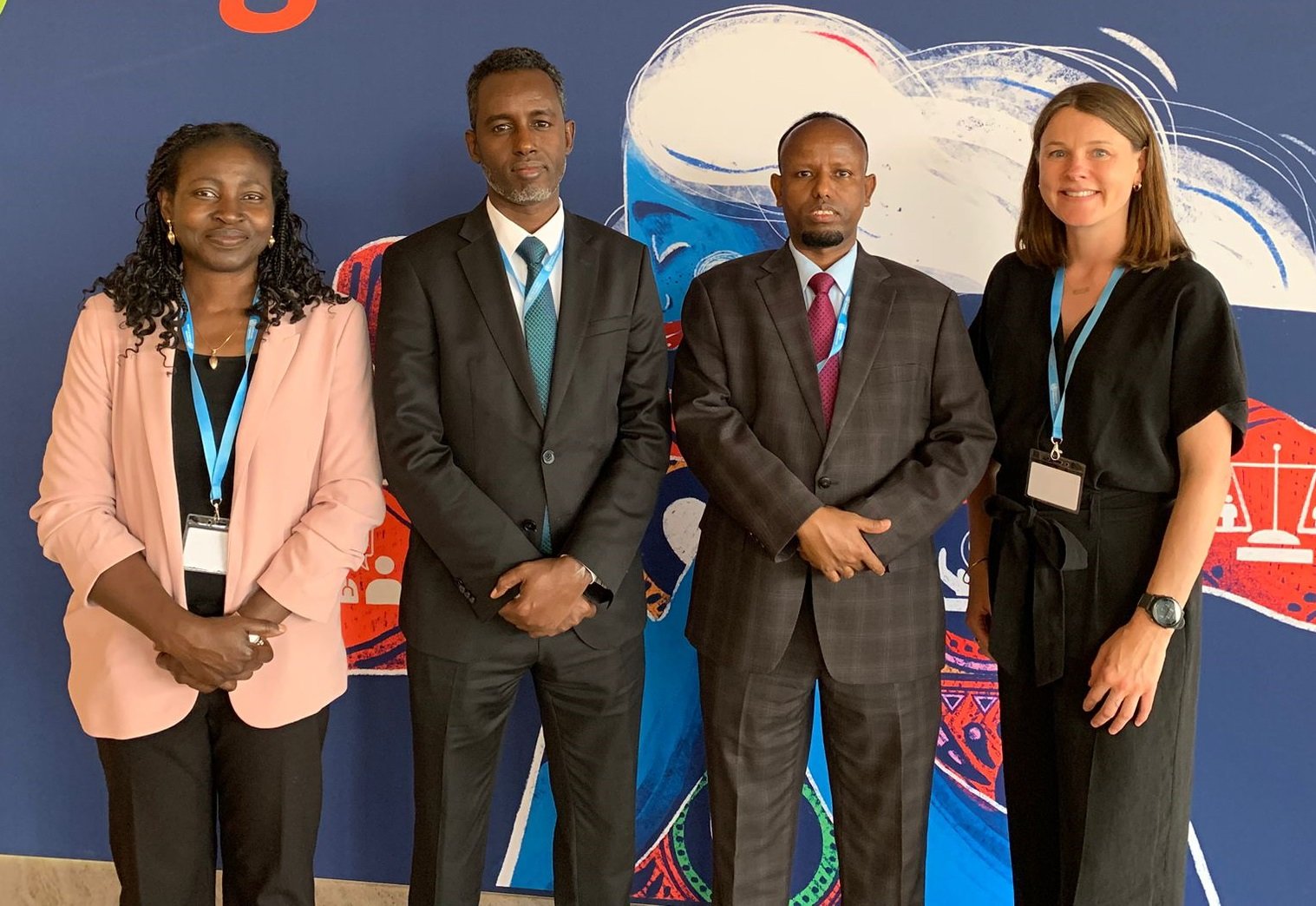
Pictured: The Uniting team with the Somalian Minister of Health and delegation.
With official development assistance significantly decreasing and increasing threats from climate-sensitive neglected tropical diseases such as dengue, WHA78 offered a timely platform to advocate for continued momentum towards elimination goals. From side events and bilateral meetings to public-private partnerships, the Uniting team made the case that the world cannot afford to slow down.
Uniting to Combat Neglected Tropical Diseases (NTDs) brought advocacy, partnership-building and political engagement to the global stage, meeting with high-level stakeholders, forging new collaborations and pushing for sustained investment in ending NTDs.
Strengthening Partnerships with ECSA
A key moment of the week was a strategic meeting between Uniting and the East, Central and Southern Africa Health Community (ECSA-HC), represented by Director General Dr Ntuli Kapologwe. The Uniting delegation, led by Executive Director Dr Isatou Touray, Gerald Ogoko, Head of Resource Mobilisation for Africa and Global Funds, and Ope Alabi-Hundeyin, Africa Insight Analyst, discussed opportunities to deepen collaboration and co-develop solutions to regional funding challenges.
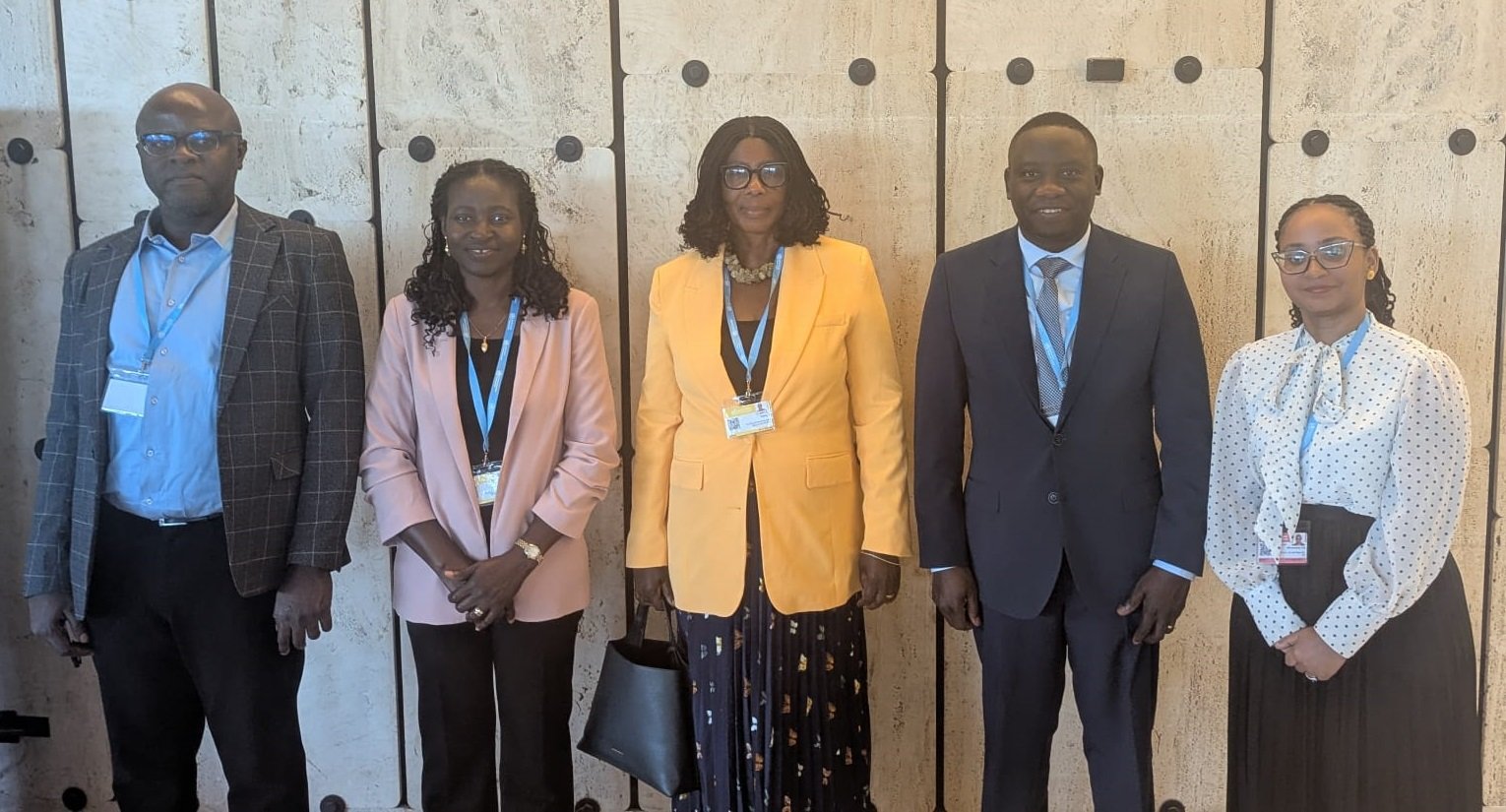
ECSA is currently developing a resource mobilisation toolkit for its member states, with the support of Dr Clara Jones, Tanzania’s NTD Programme Manager. They are also planning a high-level Ministers of Health conference in Arusha this June, focusing on the impact of reduced official development assistance (ODA), country-led solutions to close funding gaps, and peer learning.
Uniting has been invited to participate in this meeting, which will provide a platform to share strategies for sustaining progress on NTDs despite constrained fiscal environments.
ECSA also shared plans to establish a regional centre of excellence for NTDs, with ten hectares of land already secured. The centre will be a flagship initiative for research, capacity building and regional coordination, and Uniting has been invited to support resource mobilisation efforts.
Discussions also touched on new opportunities for NTD financing.
Supporting Country Ownership: Liberia’s Commitment
In a promising update, Uniting met with Liberia’s Minister of Health, Dr Louise M. Kpoto, and Assistant Minister Dr Cuallau Lillian Jabbeh Howe to discuss Liberia’s endorsement of the Kigali Declaration on NTDs. The Declaration, calls for renewed political will and cross-sector partnerships.
Liberia’s continued leadership reflects the growing momentum among countries to take ownership of their NTD programmes.
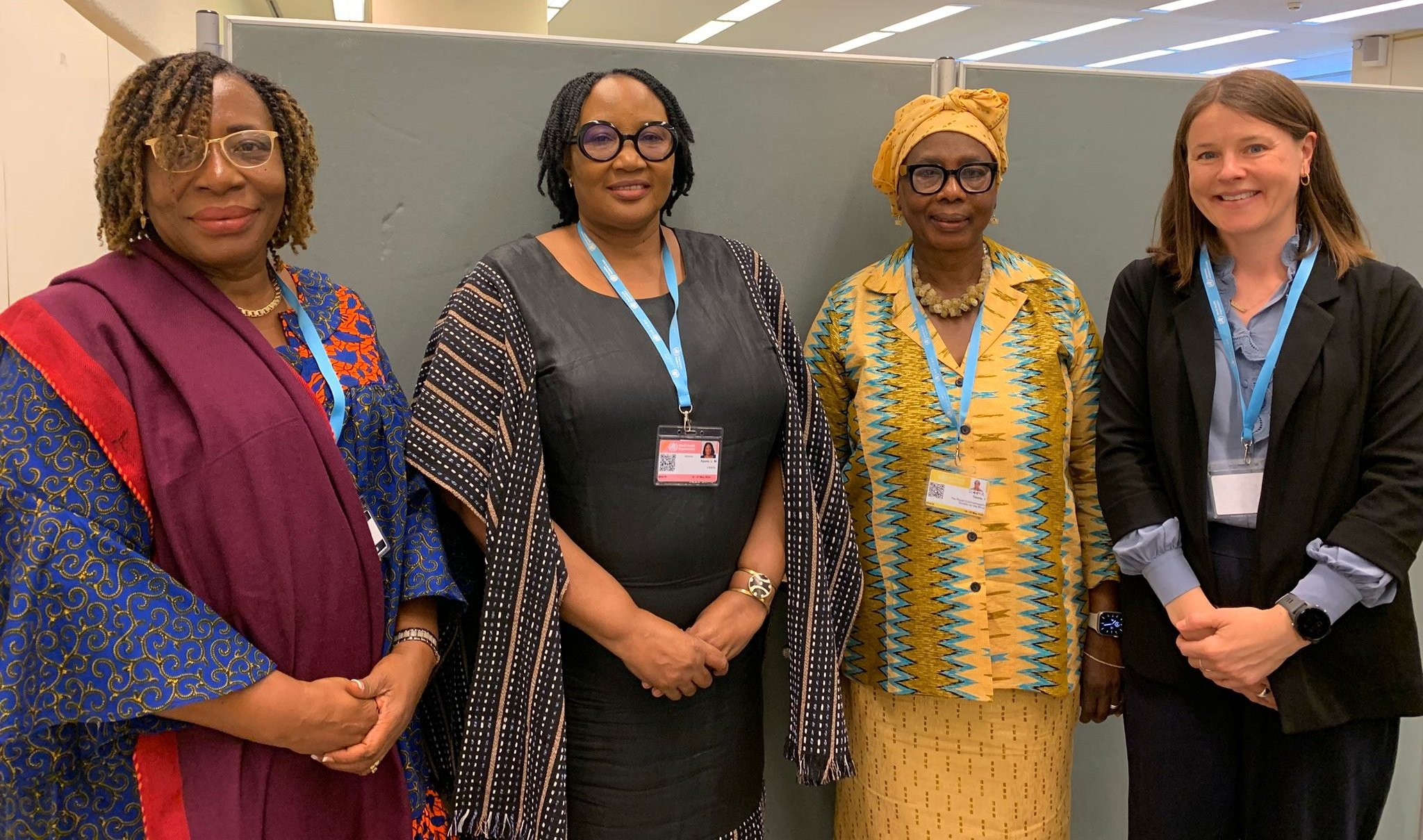
Catalysing Industry Commitment: Novartis and ILEP Engagement
During WHA78, Uniting Executive Director Dr Touray also held bilateral meetings with CEO of ILEP Geoff Warne, to explore the global trajectory for leprosy elimination.
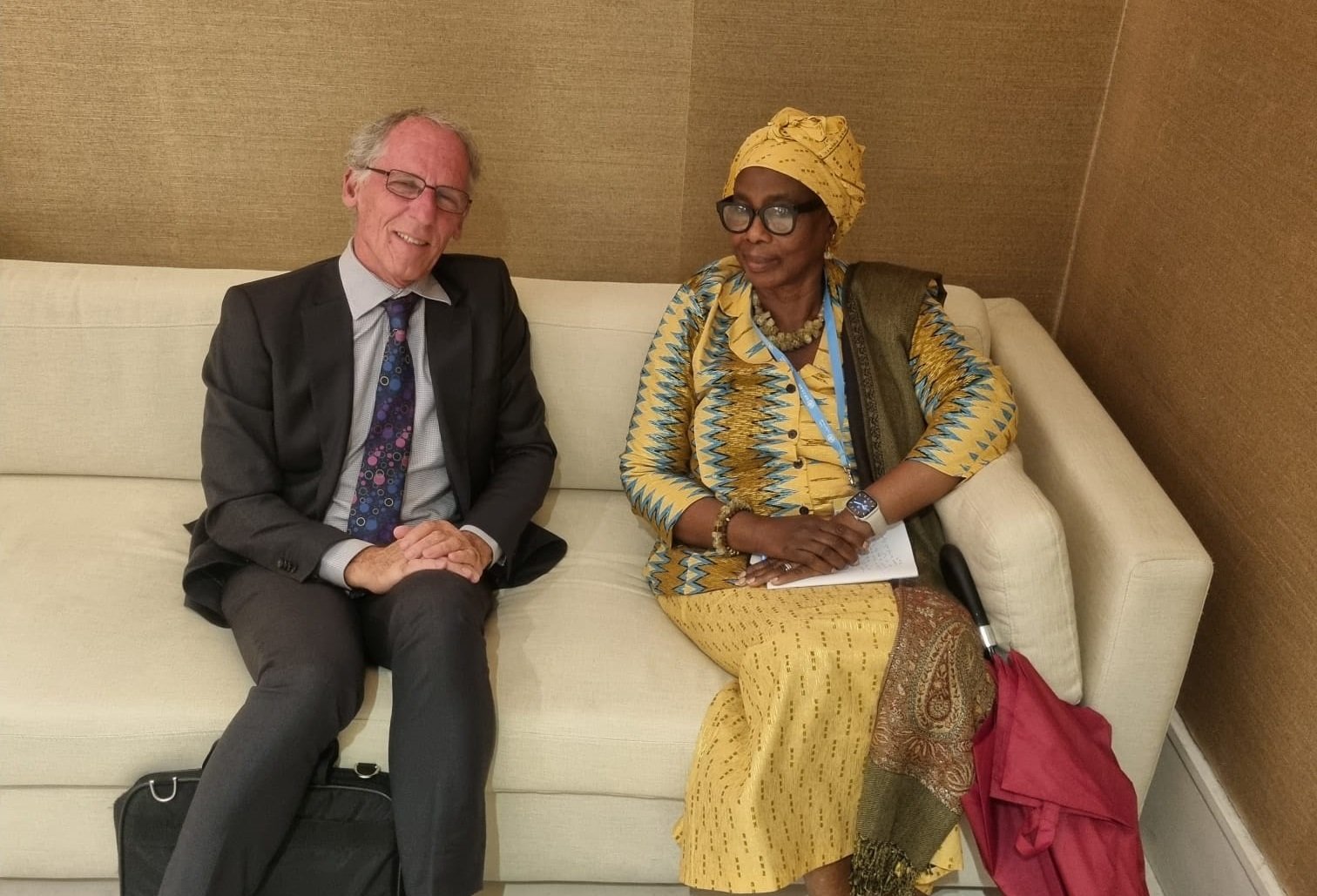
Dr Touray also met with President of Global Health at Novartis Dr Lutz Hegemann. The meeting with Novartis reaffirmed shared goals around drug donation programmes and scaling access to treatment. Novartis, a long-standing partner in the NTD space, is now expected to nearly double its initial commitment made at the Kigali Summit in 2022, increasing from USD 250 million over five years to a projected USD 490 million by the end of 2025.
This significant increase underscores the kind of long-term commitment needed to stay the course in the fight against NTDs.
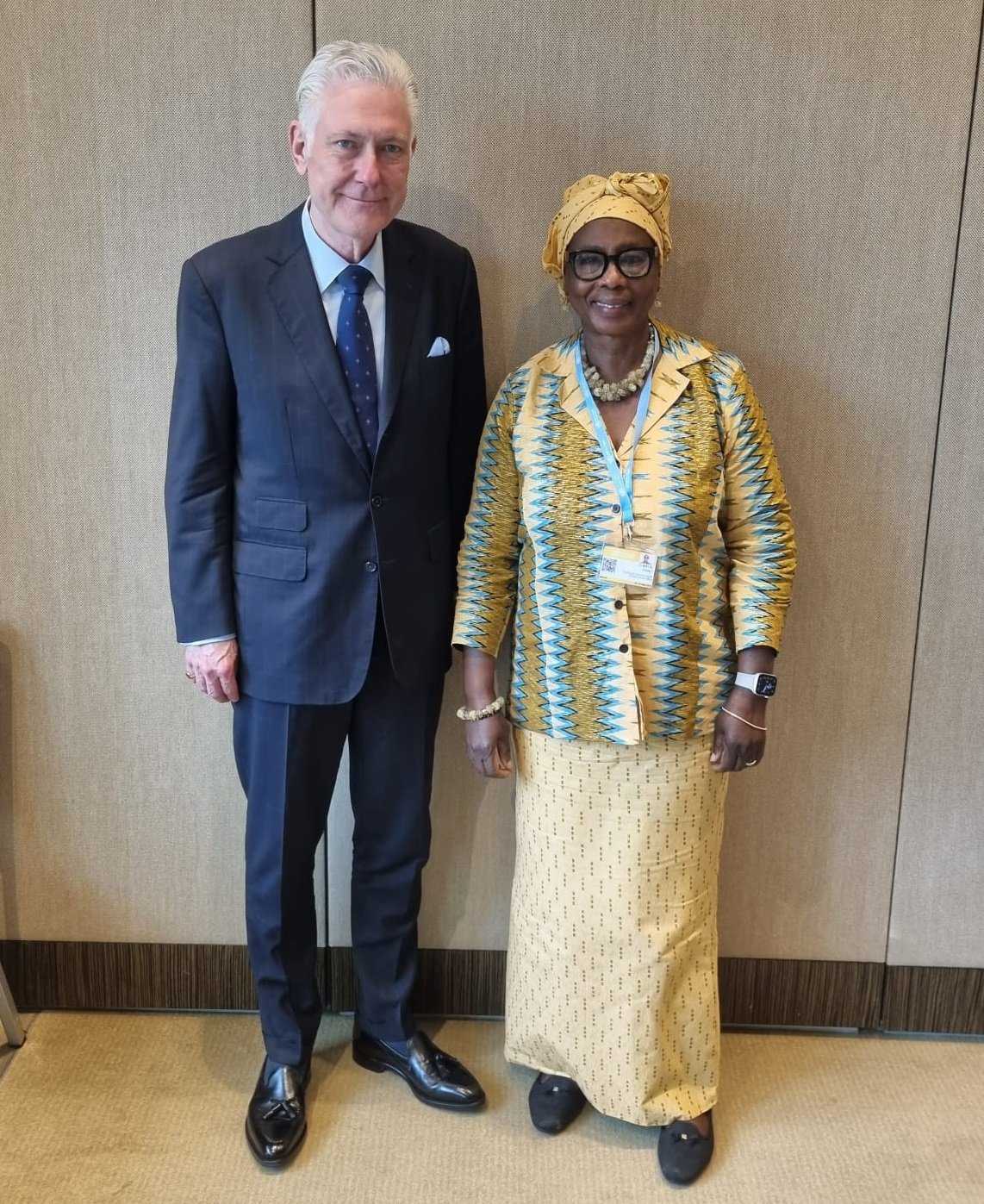
Advancing the Dialogue on Health Financing
The Uniting team also participated in two major WHA78 side events on the future of global health financing.
“Accelerating Catalytic Financing in a New Era” explored the importance of local and regional leadership in developing context-specific solutions.
Dr Sajana Bhardwaj, Deputy Director, Policy Advocacy and Communications of the Gates Foundation emphasised that collaborative approaches must be designed with the voices and needs of affected communities at the centre.
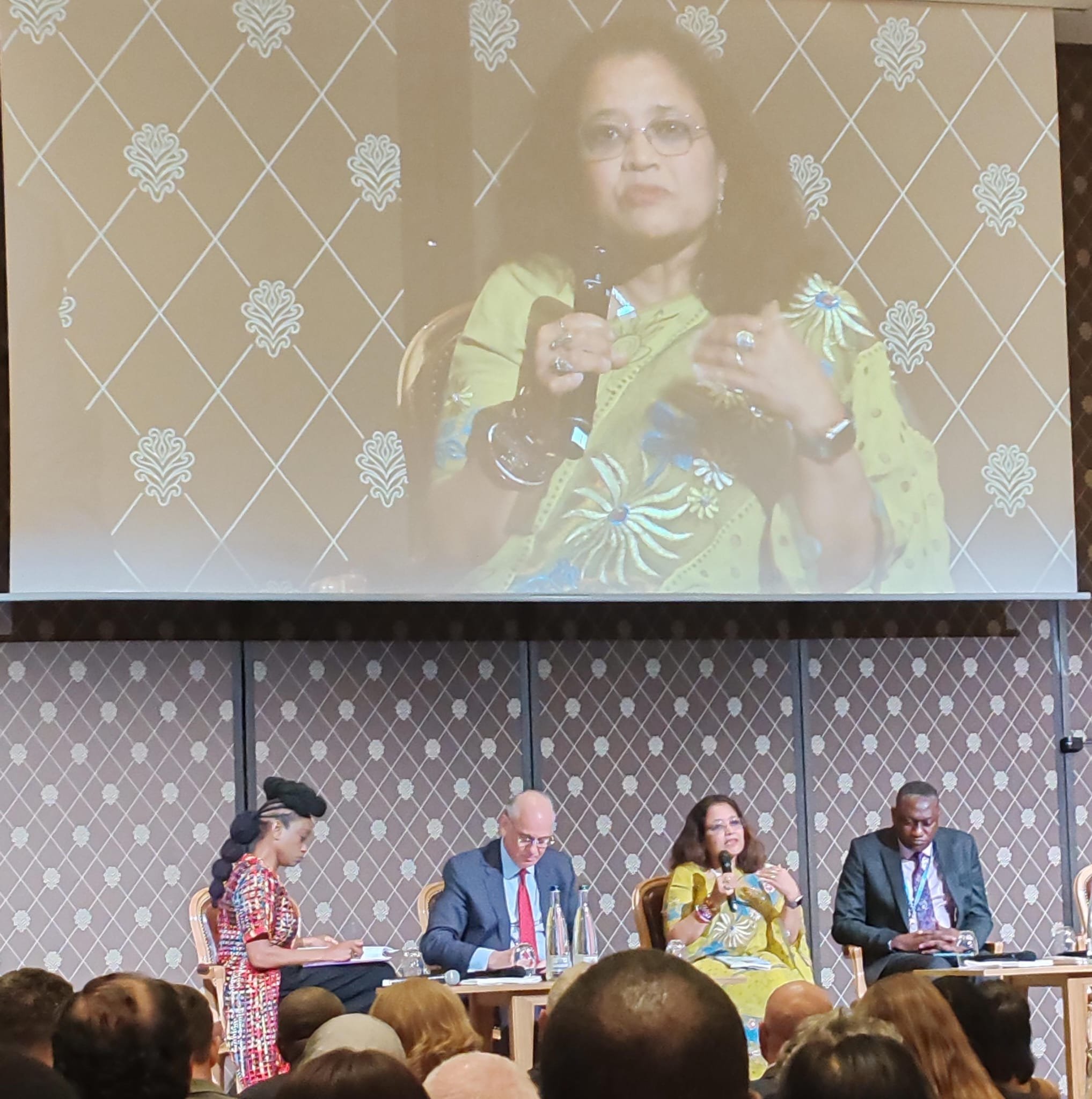
"How philanthropy is guided is really based on country leadership, we've always worked like that, and it depends how the context of that country is, what is the country leadership driving, setting the agenda, where is it that they see the challenges? What is it that they are calling out for in terms of solutions? How can we come in and be catalytic in some ways. There has never been a time before like now, to really maximise the information we have."
“Health Financing: What Now? What Next?” brought together a range of perspectives from national governments, innovators and donors to address the evolving financing crisis for climate-sensitive infectious diseases, including NTDs. With compelling evidence that climate change is accelerating the spread of diseases such as dengue, speakers warned that without urgent and sustained investment, decades of progress risk being lost.
The event made a strong call to action to develop innovative financing models, such as performance-based approaches and catalytic capital, that can bridge the growing funding gaps. It also highlighted how NTDs, often sidelined in health finance discussions, must be front and centre of climate and health solutions.
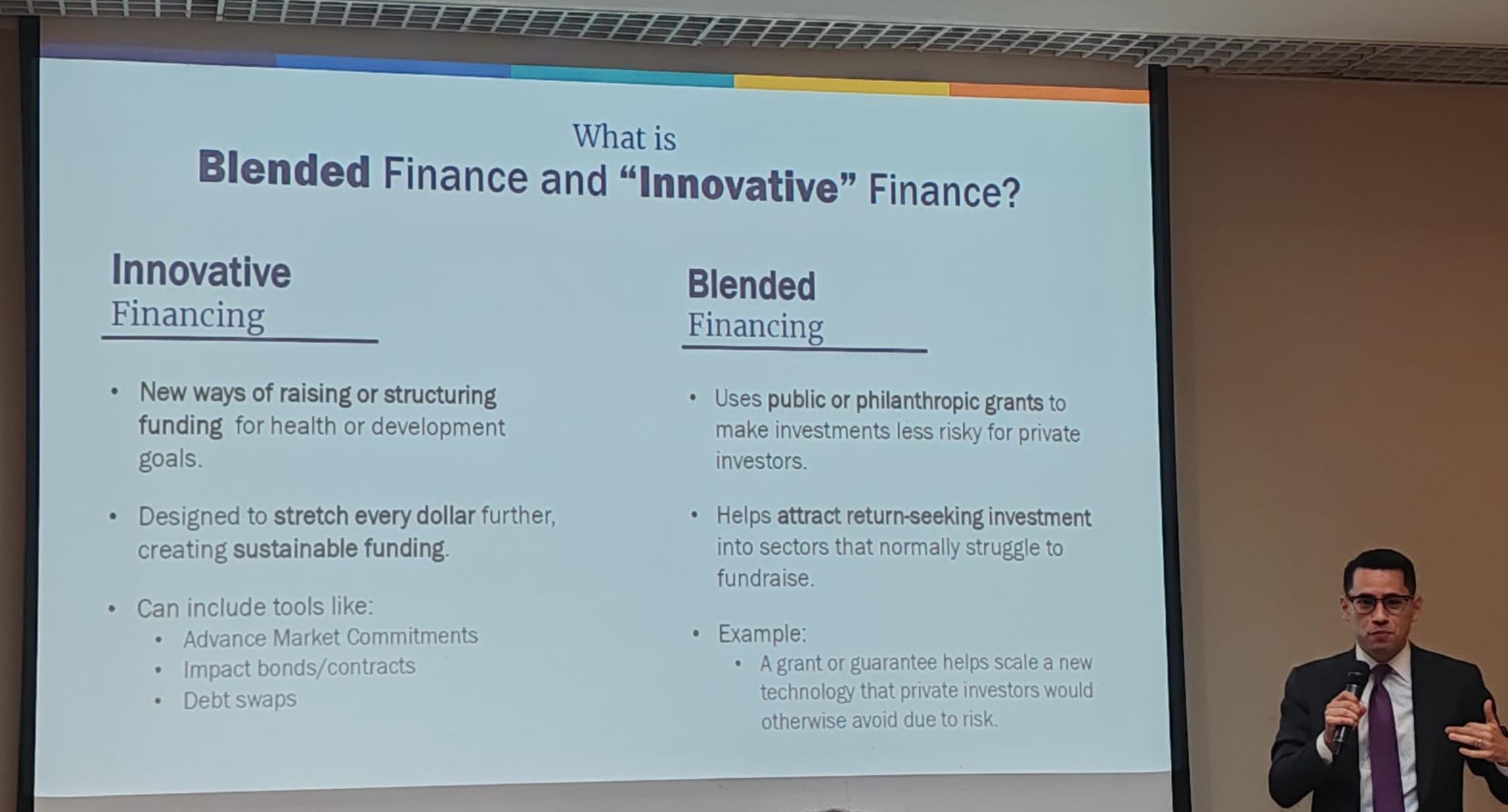
As WHA78 day two drew to a close, the message was clear: beating NTDs will require not only scientific innovation but also sustained political leadership, new financing models, renewed investment and deep collaboration across sectors. In the face of economic pressures and competing priorities, it is more important than ever to champion country ownership, invite new donor partners to the table and ensure that no one is left behind.
Uniting to Combat NTDs is committed to keeping up the momentum and supporting countries and communities as they lead the charge towards NTD elimination.

As Uniting’s team made their way through Geneva city centre on day three of the 78th World Health Assembly, they encountered a striking public exhibition on snakebite, located by the lake. One sculpture, Venom’s Whisper, is painted in the colours of the Democratic Republic of the Congo (DRC) flag and constructed from recycled footwear, etched with sobering statistics. It represents the thousands of lives lost each year to snakebite in the DRC, particularly among those walking barefoot or in minimal footwear.
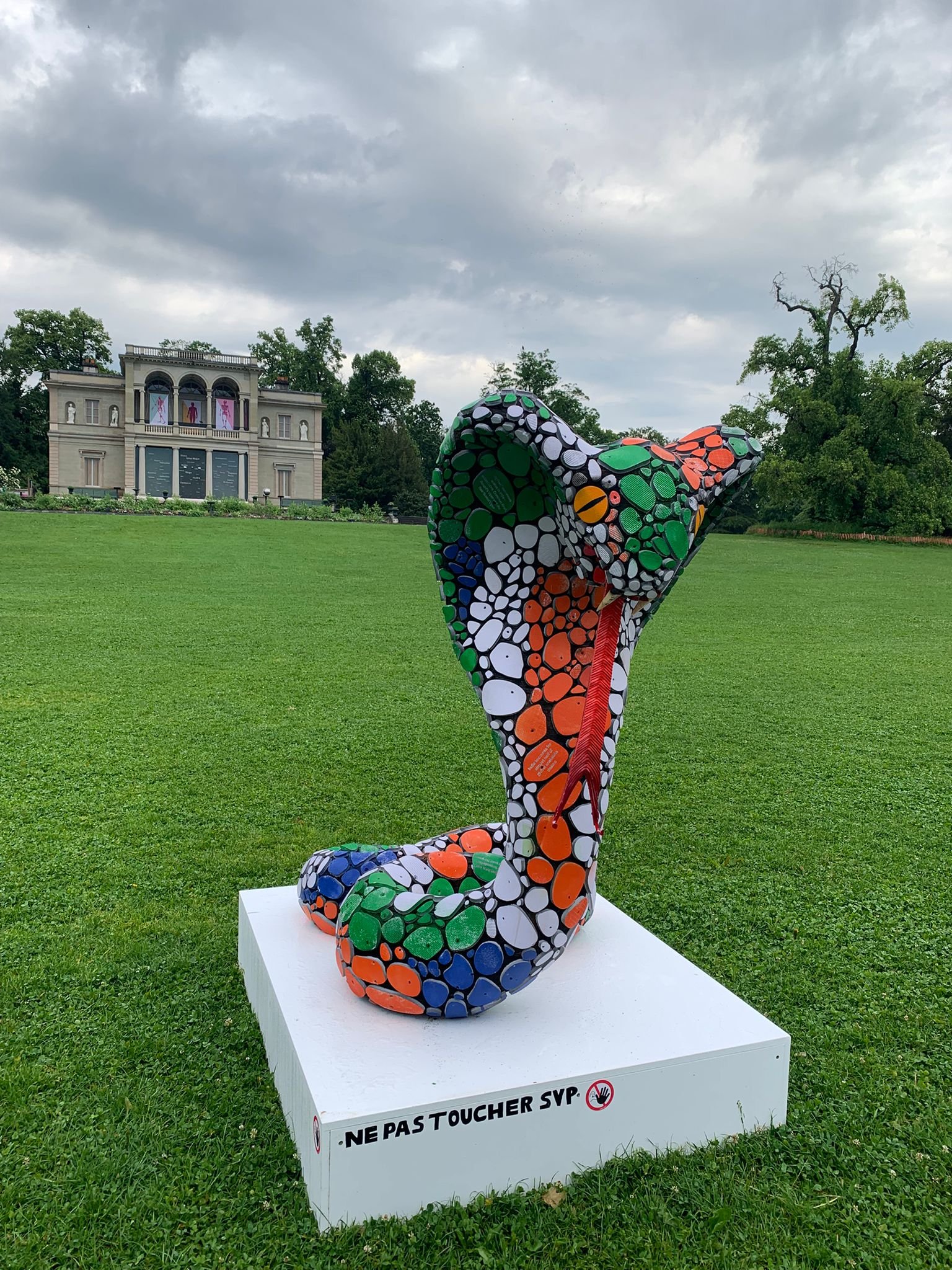
The installation is part of the Strike Out Snakebite (SOS) campaign, which urges global health leaders to act on this overlooked crisis. With up to 138,000 deaths each year and millions more affected by long-term disability, snakebite is a stark example of how inequality continues to shape access to healthcare. The campaign calls for increased investment in prevention and treatment, and for snakebite to be prioritised in global policy.

Later in the day, Uniting Board Chair Dr Winnie Mpanju-Shumbusho co-chaired the launch of the Lancet Commission on Disability and Health. This inaugural Commission brings together leading researchers and practitioners from around the world, including many connected to NTDs, to generate evidence on how to build more inclusive health systems.
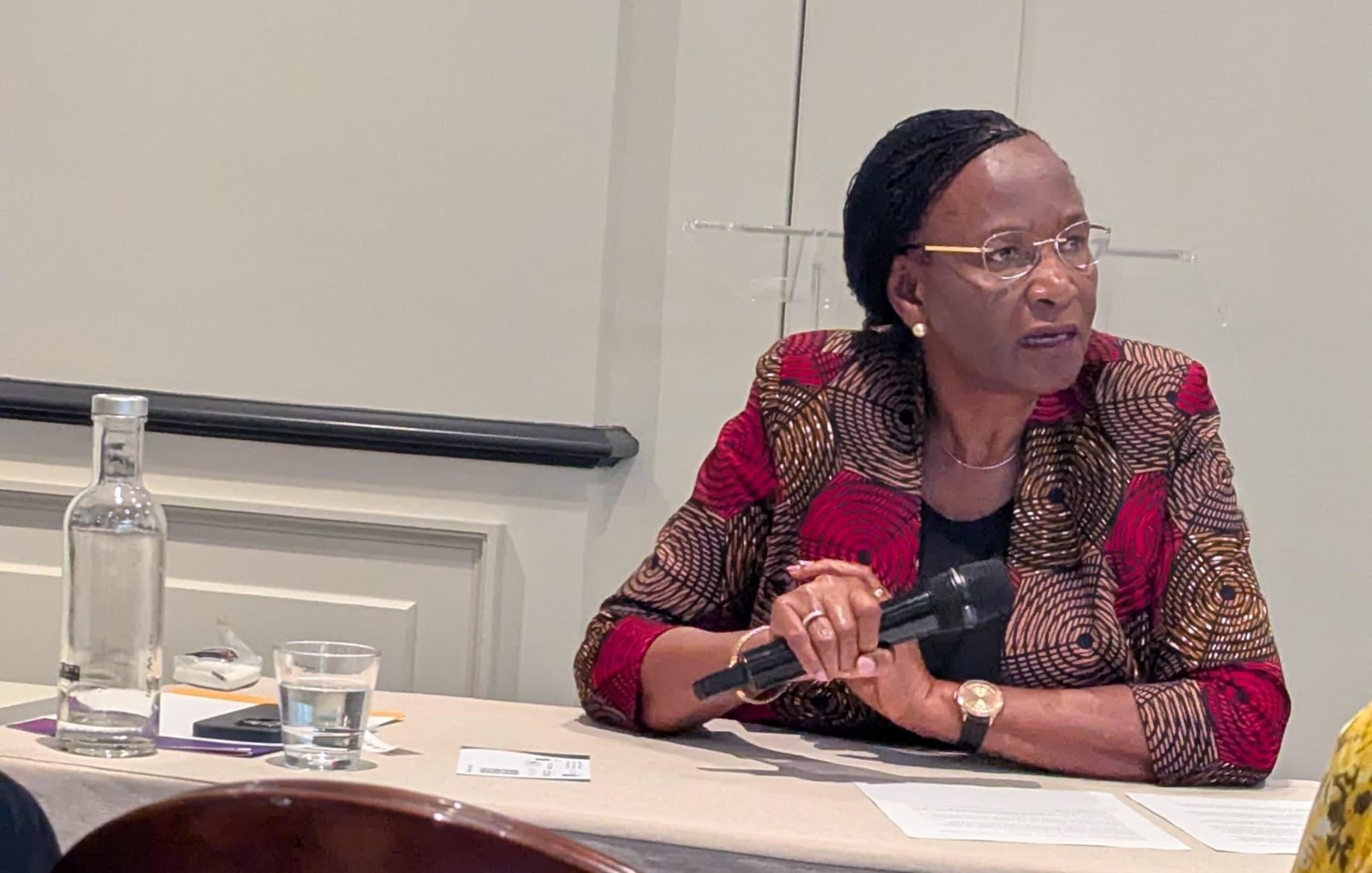
Speaking at the event, Dr Mpanju-Shumbusho called for a rethinking of how disability is addressed in global health.
“We must move beyond seeing disability as simply a medical issue and begin treating it as a matter of social and economic equity, human rights, and inclusive development,”
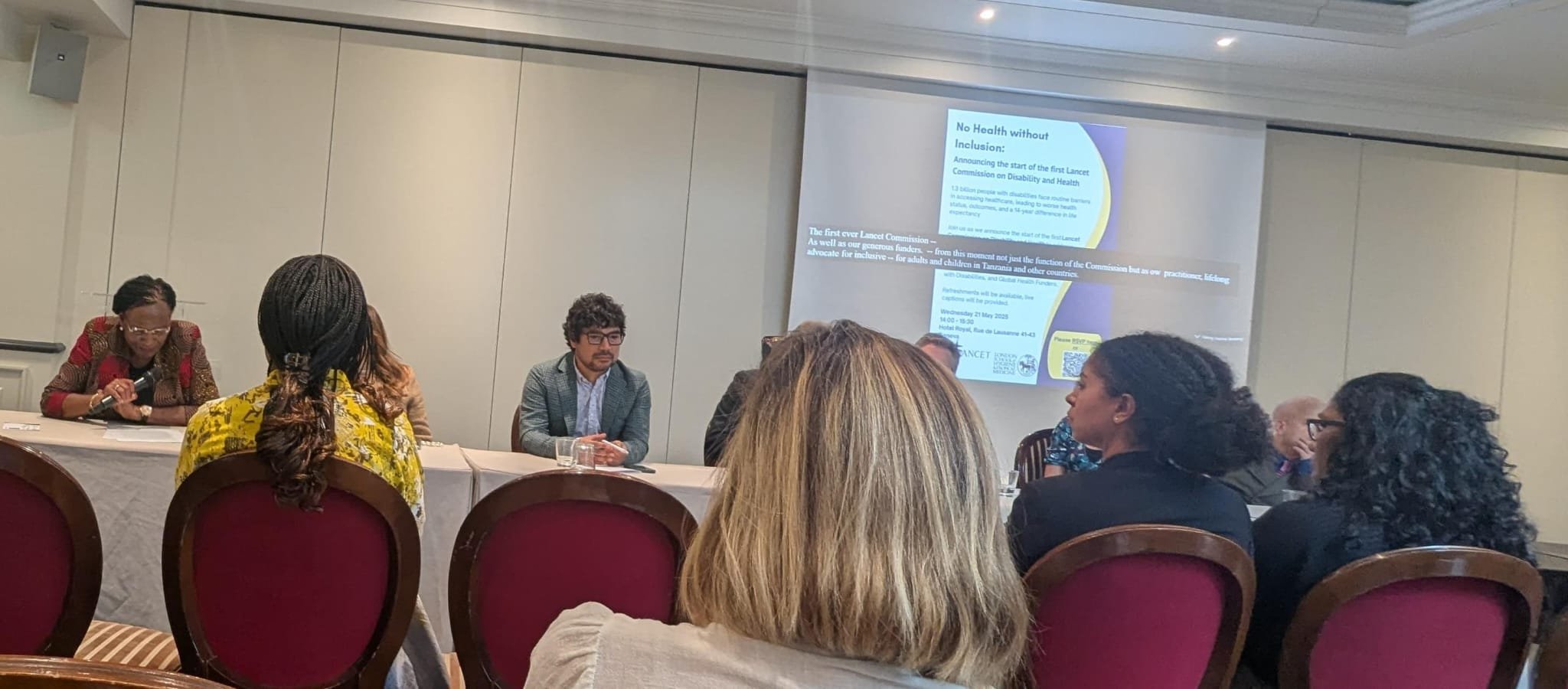
Drawing on her experience in NTDs, HIV, TB and malaria, Dr Mpanju-Shumbusho noted that preventable diseases often leave people with lifelong disabilities, many of whom are then excluded from health systems and social support.
The Commission will now begin the work of conducting its research over the next two years, supported by partners including The Lancet, the Conrad N. Hilton Foundation, and the Foreign, Commonwealth & Development Office. It aims to explore inclusive strategies for a range of diseases, including those linked to disability from NTDs such as lymphatic filariasis, trachoma and schistosomiasis. The goals of the Commission include developing actionable evidence on how to make health systems more equitable and inclusive for those living with disabilities.
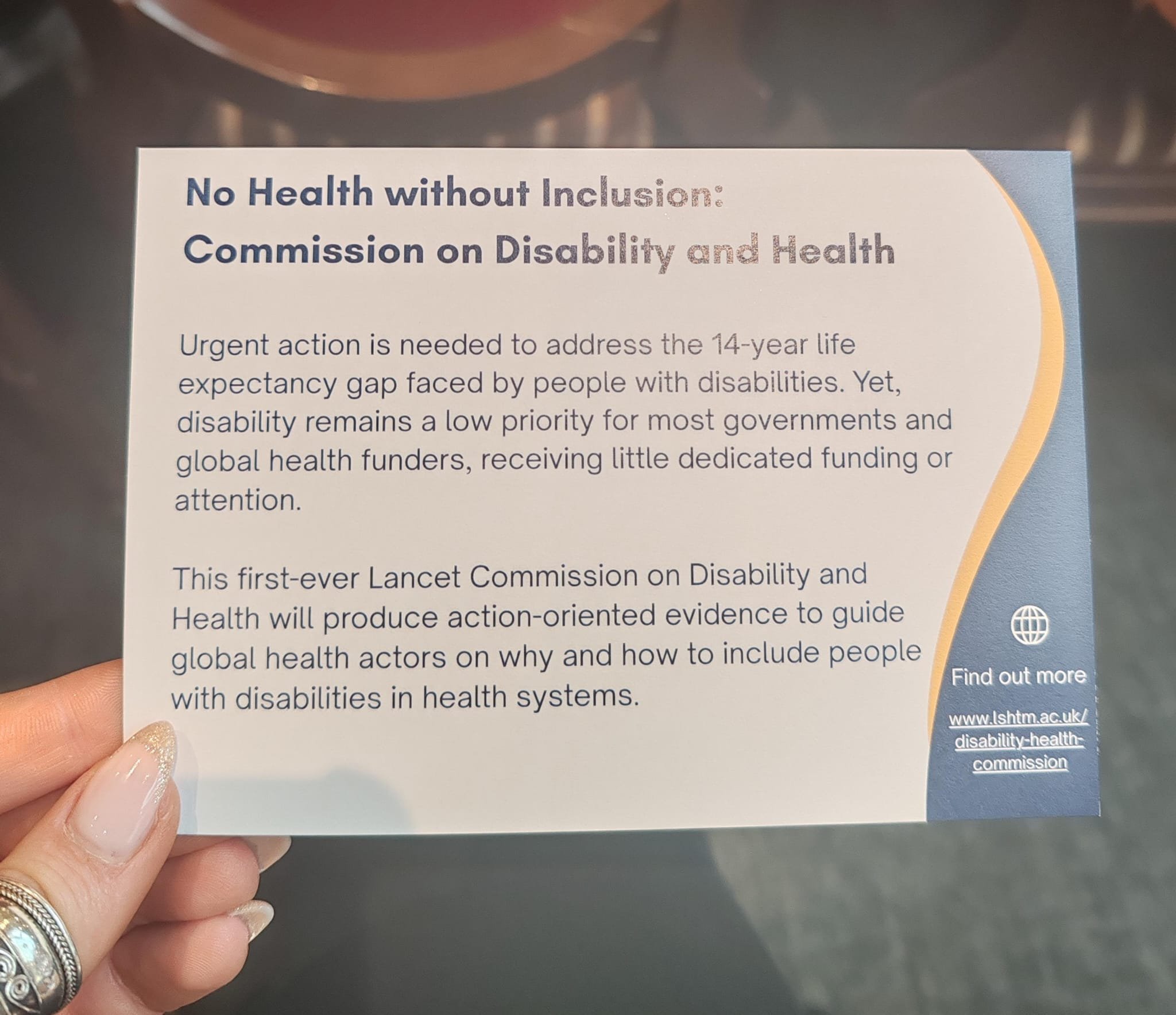
Read more on the launch of the first Lancet Commission on disability and health here.
Meanwhile, Uniting also attended the GONE (Global Onchocerciasis Network for Elimination) meeting, hosted by the African Union Commission, which celebrated a landmark agreement between nine East African countries to eliminate visceral leishmaniasis (VL) through cross-border cooperation.
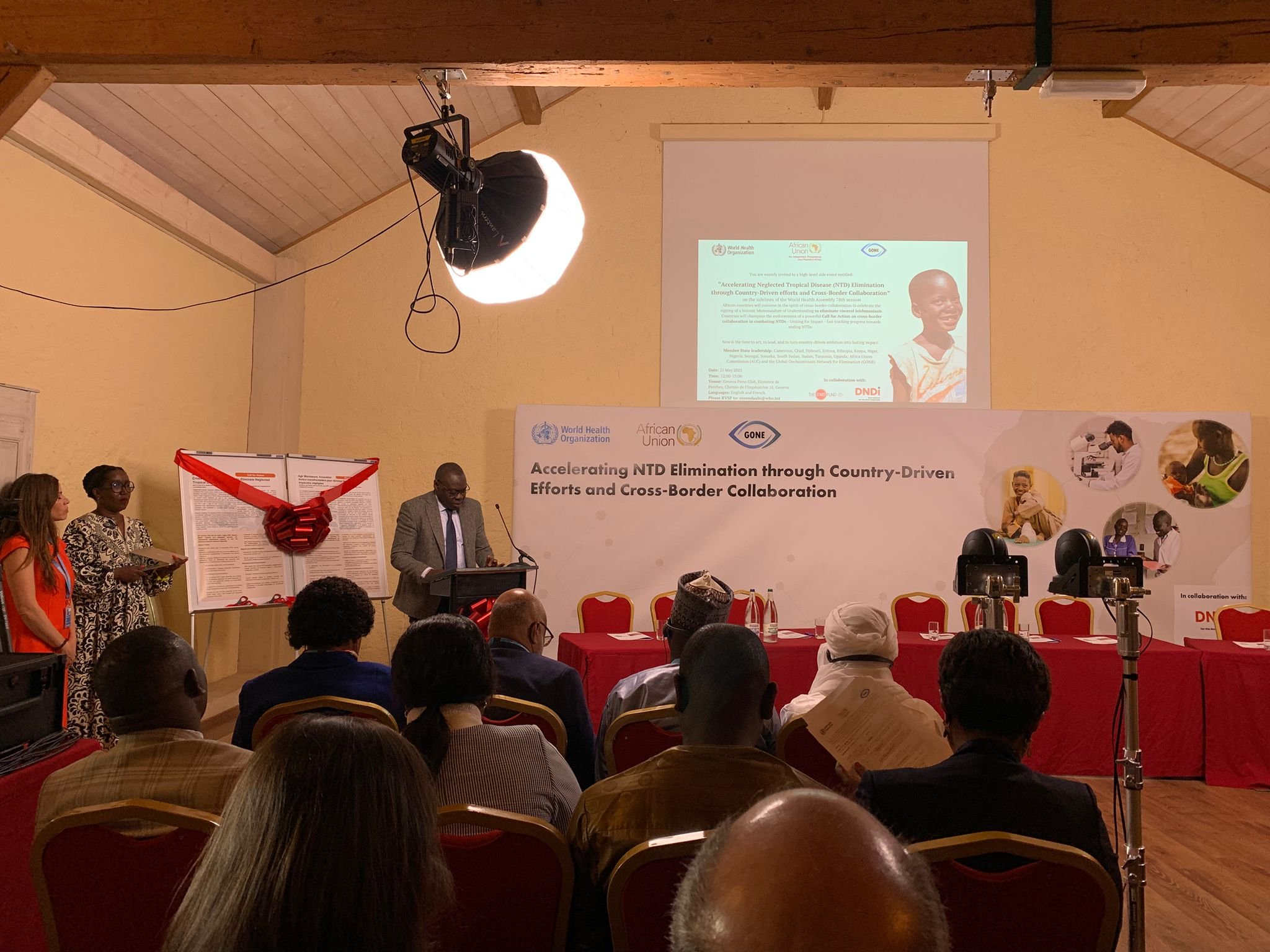
Dr Ibrahima Socé Fall, Director of WHO’s Global NTD Programme, opened the session by acknowledging the progress made across the region.
“This is more than a health initiative, it’s a movement for social justice.”
Countries shared success stories, signed a Memorandum of Understanding, and endorsed a Call to Action on regional collaboration.
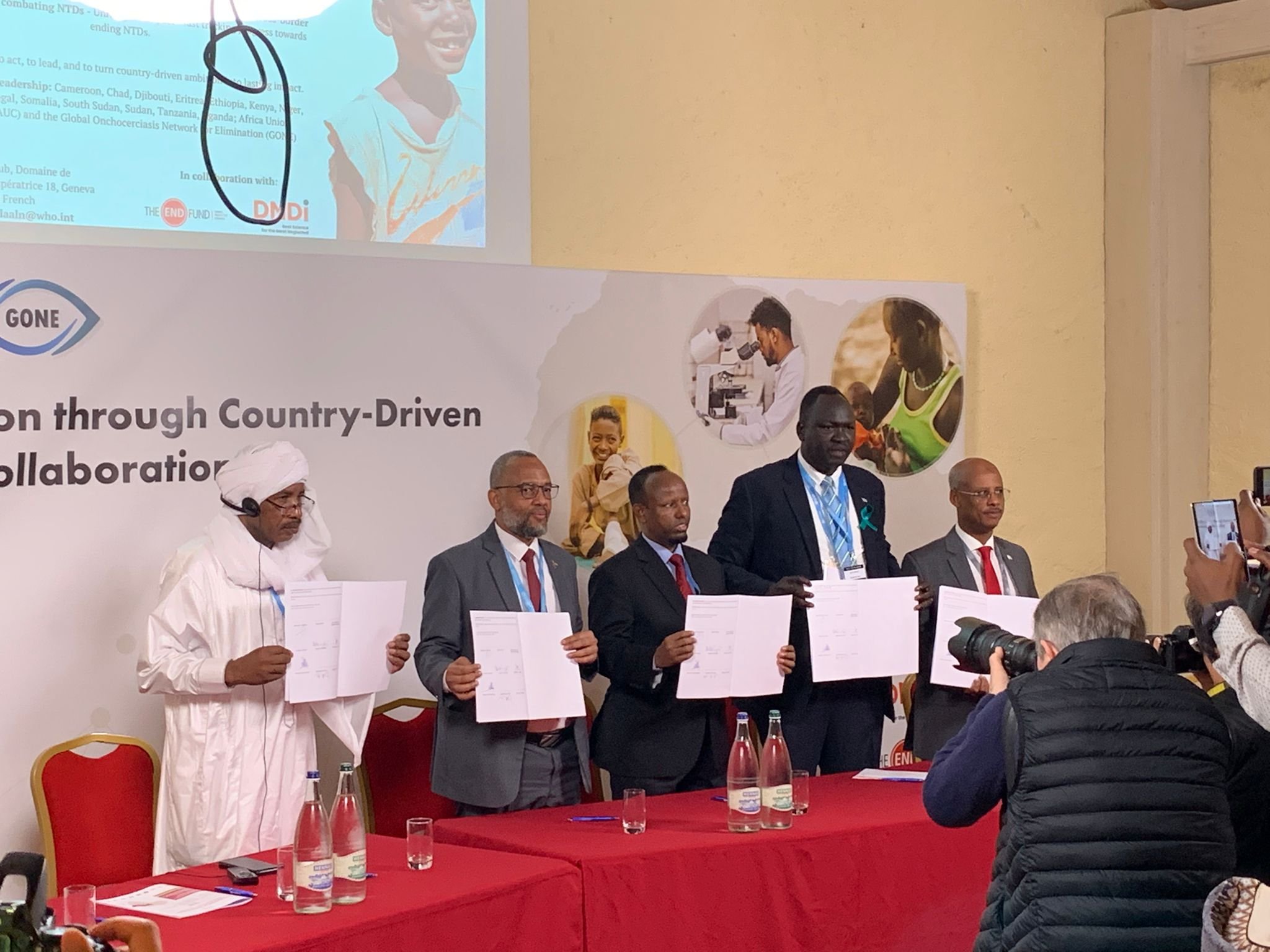
Cross-border data sharing, integrated surveillance, and joint planning were highlighted as essential for sustained progress, particularly as climate change increases the spread of vector-borne NTDs. Participants also voiced support for a proposed WHA resolution on skin NTDs, which remain under-prioritised despite their heavy burden on affected communities.
Read more on this historic agreement on visceral leishmaniasis from Eastern African countries here.
Throughout WHA78, Uniting has worked alongside partners to highlight neglected topics and call for investment, support Member State leadership, and advocate for inclusive, sustainable solutions to NTDs. As the Assembly continues, we remain committed to ensuring that the needs of people affected by NTDs are central to the global health agenda.
On day four Dr Tedros Adhanom Ghebreyesus, Director-General of the World Health Organization, opening a reception focused on Guinea Worm Disease. . The event reaffirmed global commitment to eradicating this debilitating disease. At the opening session of WHA78 Dr. Tedros also paid tribute to the enduring legacy of the late President Jimmy Carter, noting that only 15 human cases of Guinea worm disease were reported last year, confined to just 12 villages in Chad and South Sudan.

One of the highlights was a meeting between Uniting and Her Excellency Ambassador Amma Twum-Amoah, African Union (AU) Commissioner for Health, Humanitarian Affairs and Social Development. The meeting took place included participation from Dr Monique Nsanzabaganwa, Deputy Chairperson of the African Union Commission, and Dr Magda Robalo, Special Advisor to the AU Commissioner. The purpose was to strengthen the strategic partnership between Uniting and the AU.
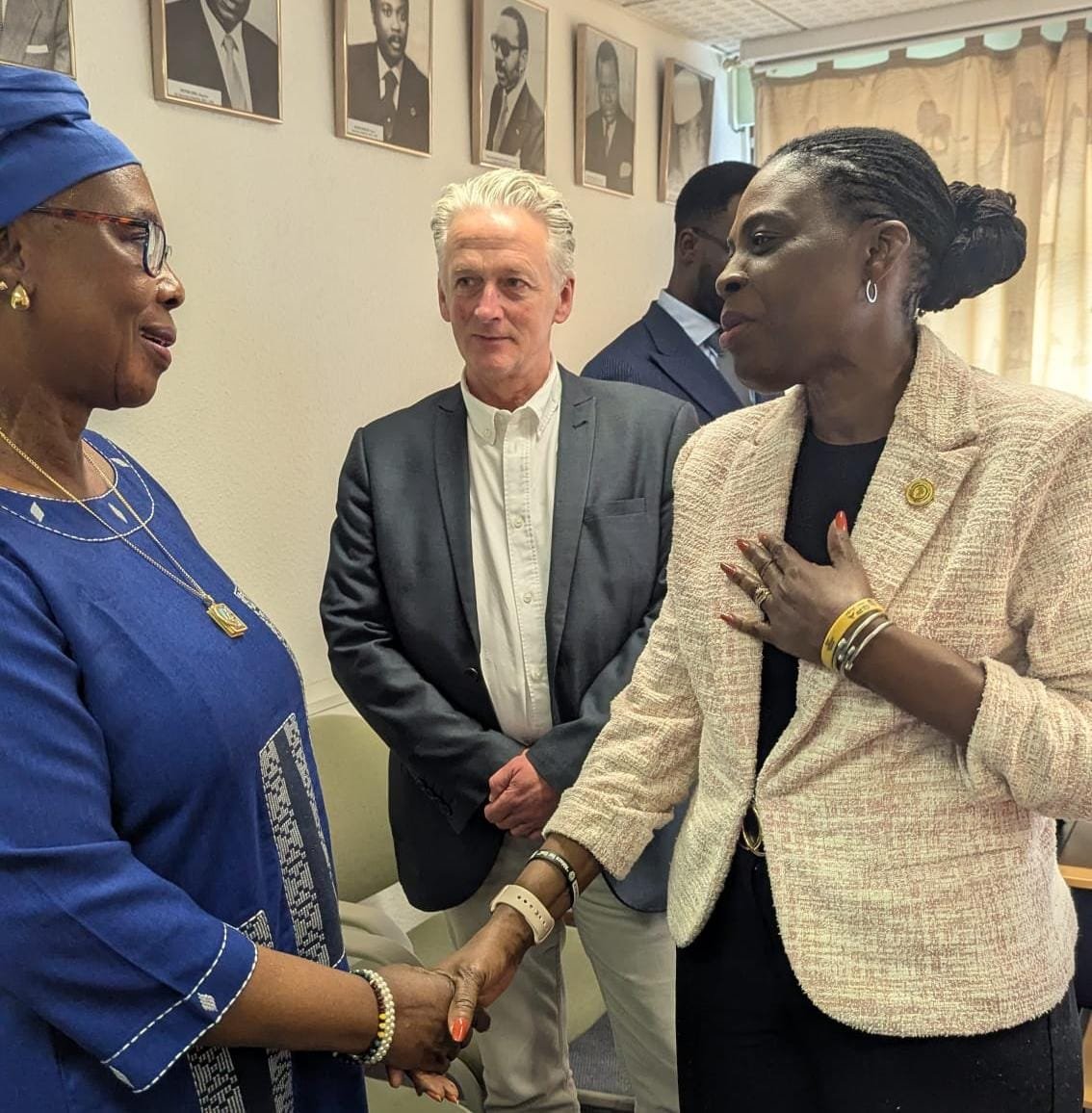
The Uniting team provided an overview of ongoing collaboration with the AU, including the secondment of AU staff to the Office of the AU Commissioner and support for the endorsement and promotion of the Continental Framework and Continental Action Plan for NTDs. These frameworks present a unified vision for NTD elimination in Africa by 2030.
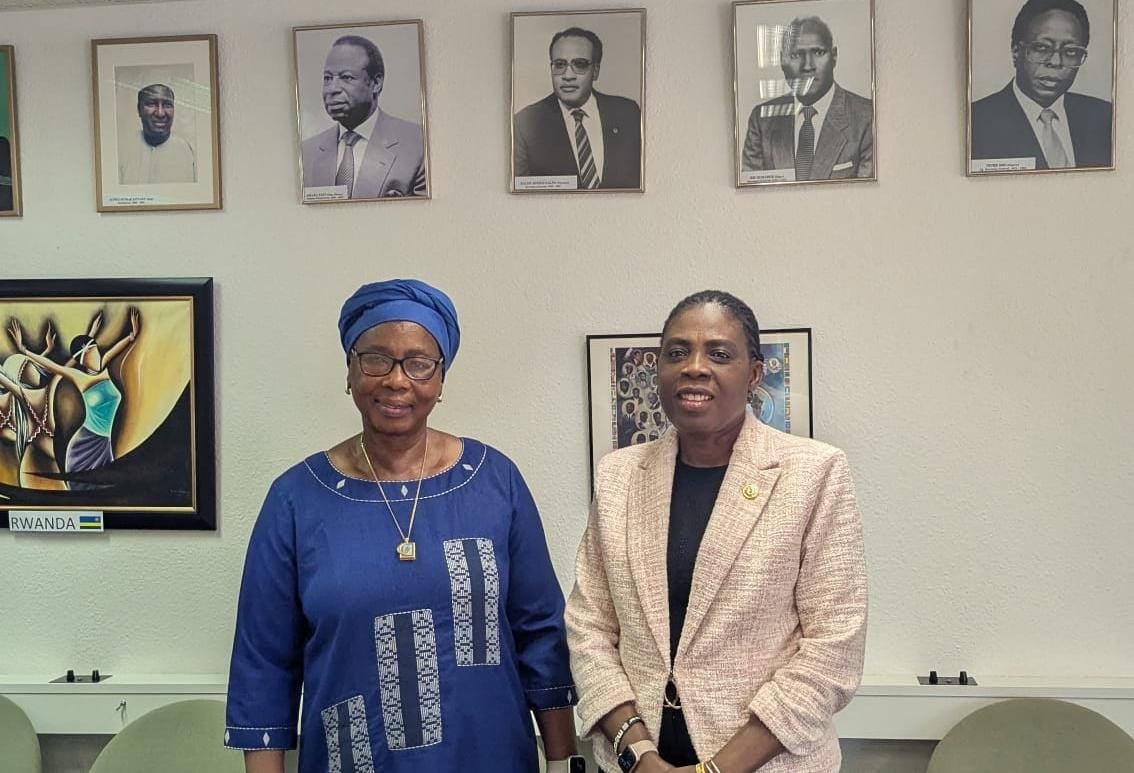
The Uniting team had the privilege of meeting with S.E. Dr Ibrahima SY, Minister of Health of Senegal.
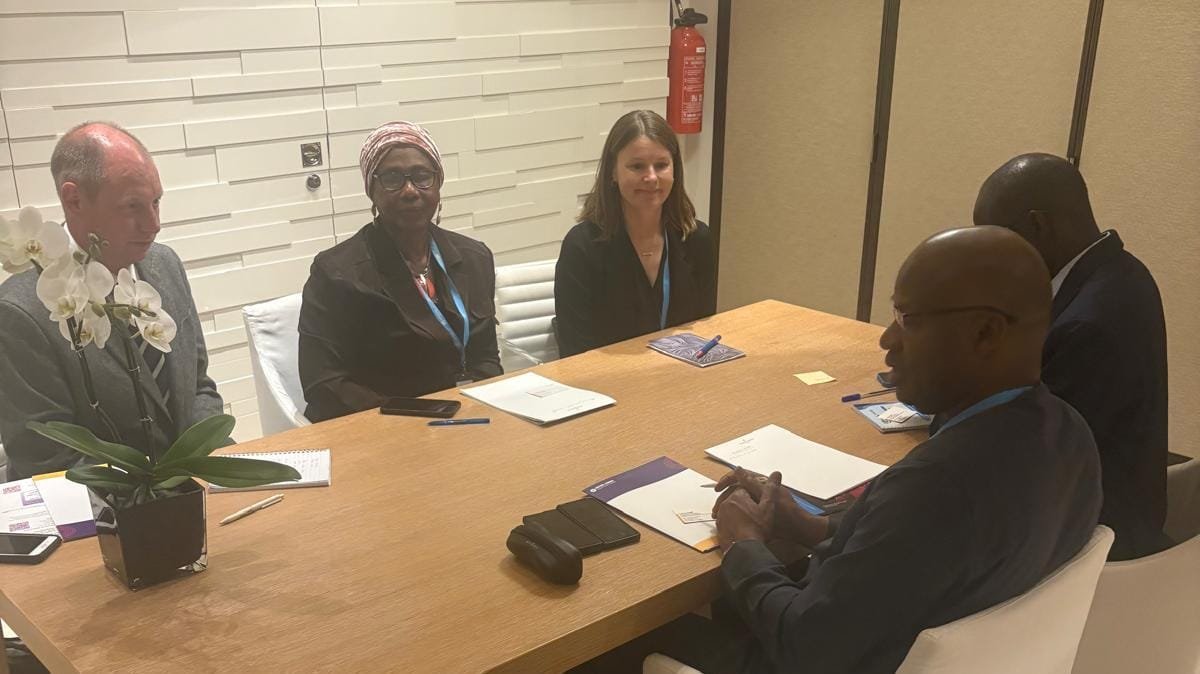
The discussion focused on strengthening country ownership and accelerating progress towards the elimination of neglected tropical diseases. Dr SY reaffirmed Senegal’s commitment and emphasised the importance of cross-sector collaboration and sustainable financing. The meeting highlighted shared priorities around equity, resilience, and local leadership—core values at the heart of Uniting’s mission.
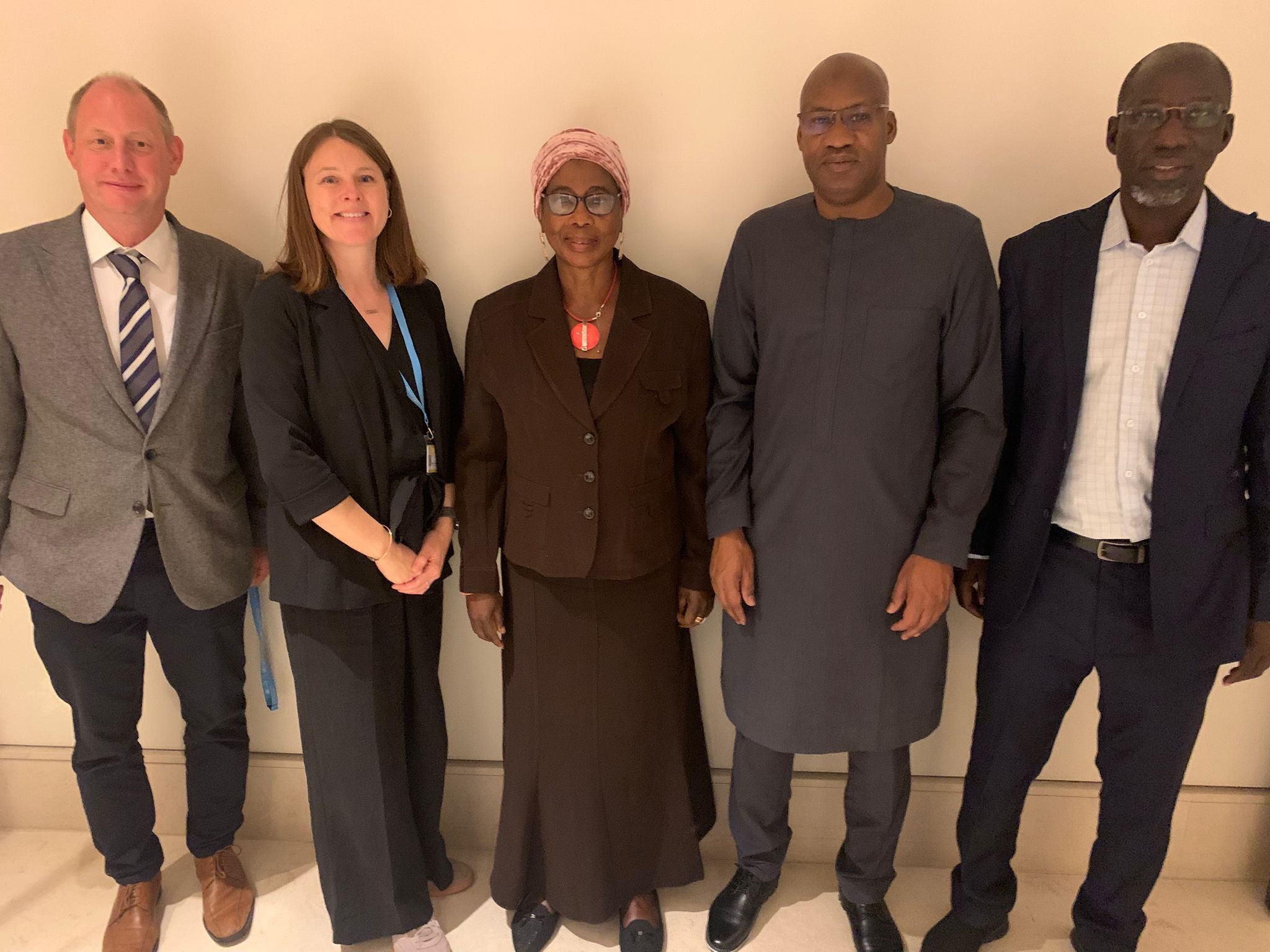
In further engagement, Uniting met with Dr Godwin Ntadom, Director of Public Health at Nigeria’s Federal Ministry of Health, to discuss the World Bank IDA21 initiative. The team highlighted the opportunity for Nigeria to access funding from the upcoming IDA21 funding cycle, starting in August, and the need for strong collaboration between the Ministry of Health and the Ministry of Finance.
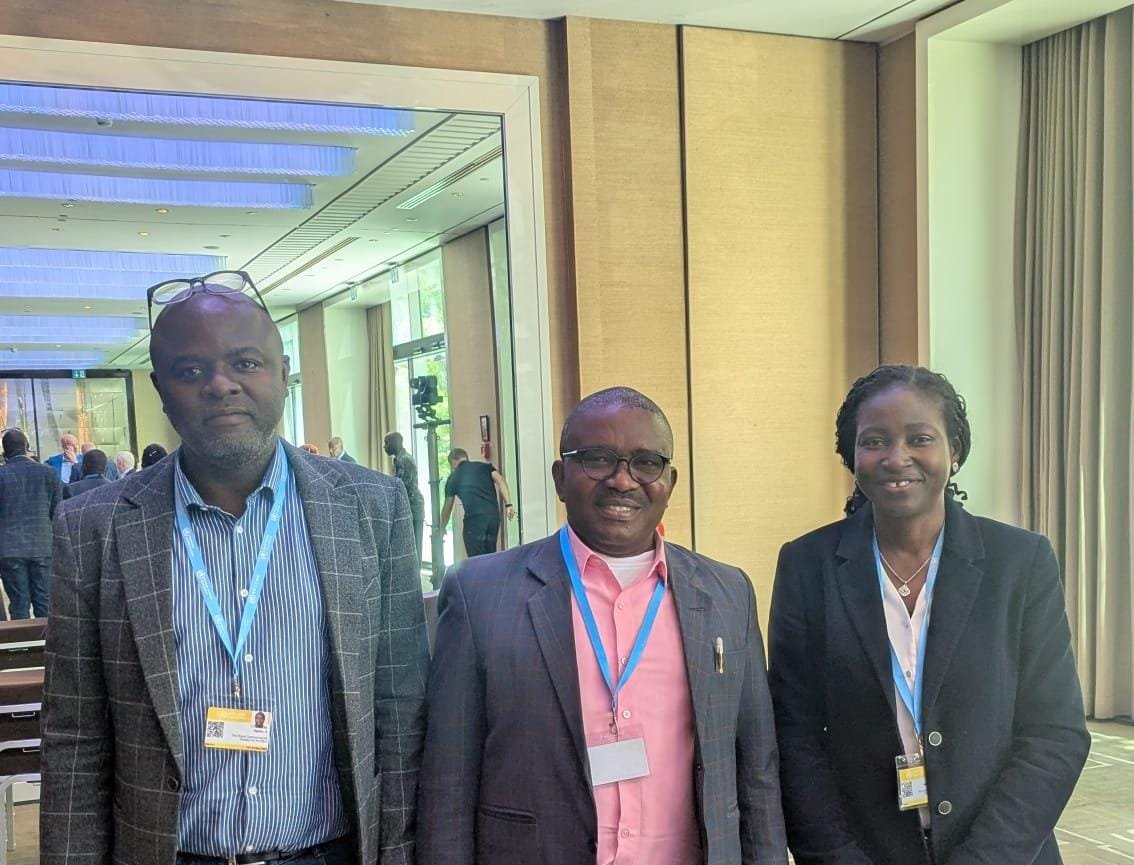
WHA is an extraordinary gathering where you're never quite sure who you might run into—from global health leaders to unexpected guests like Gareth Southgate. The Uniting team is always ready to branch beyond the NTD space, building connections and forging new partnerships to amplify our shared mission to beat neglected tropical diseases.
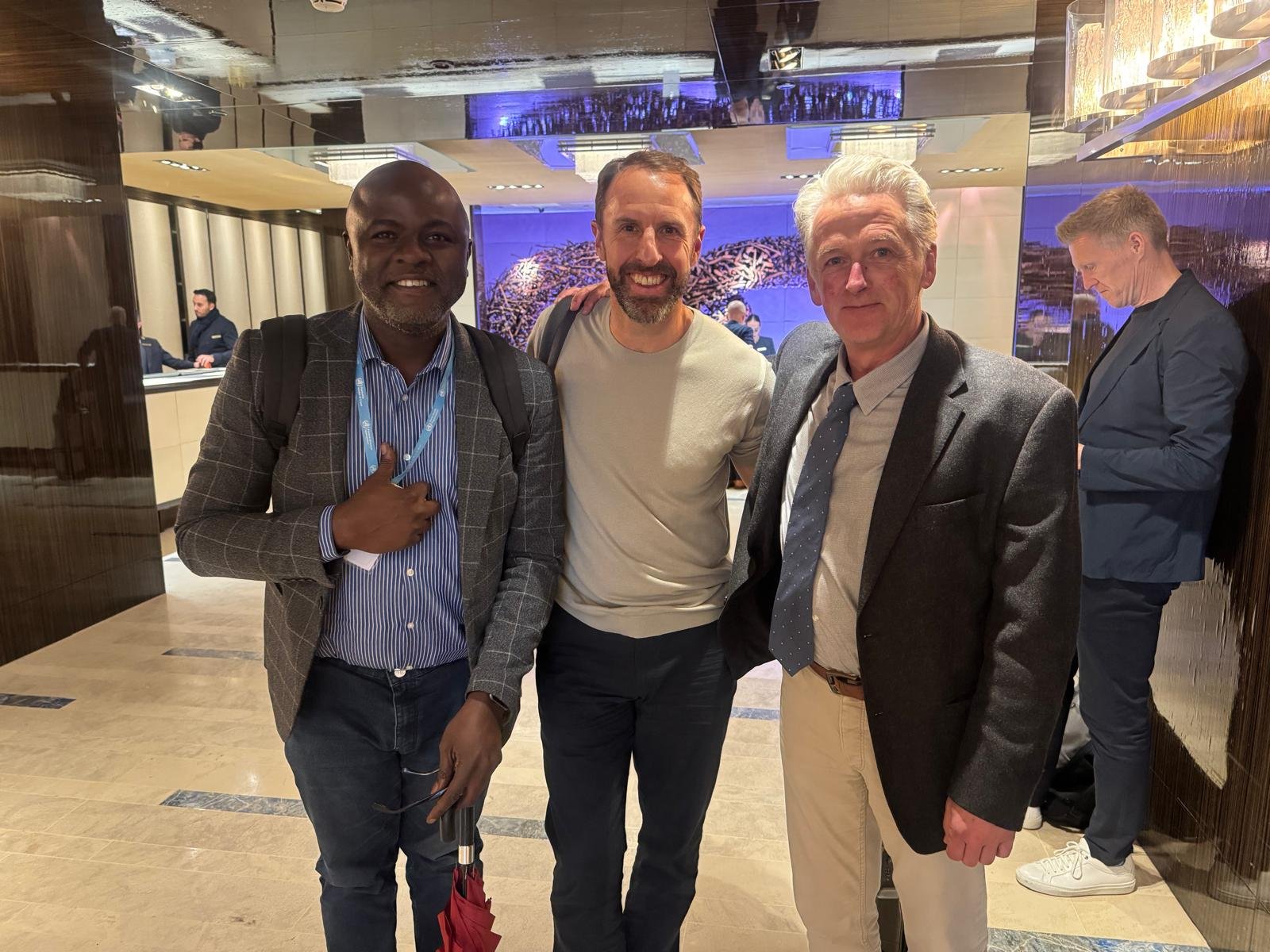
WHA78 reaffirmed defeating neglected tropical diseases is not only a scientific and financial challenge, but a moral imperative grounded in equity, inclusion, and shared responsibility.
Uniting to Combat NTDs proudly stood with partners old and new to accelerate action, support country leadership, and drive innovative solutions that leave no one behind. As we look ahead, Uniting remains committed to amplifying local voices, unlocking transformative funding, and forging the cross-sector partnerships needed to deliver a world free from NTDs.
The momentum is real—and together, we will keep it going.

